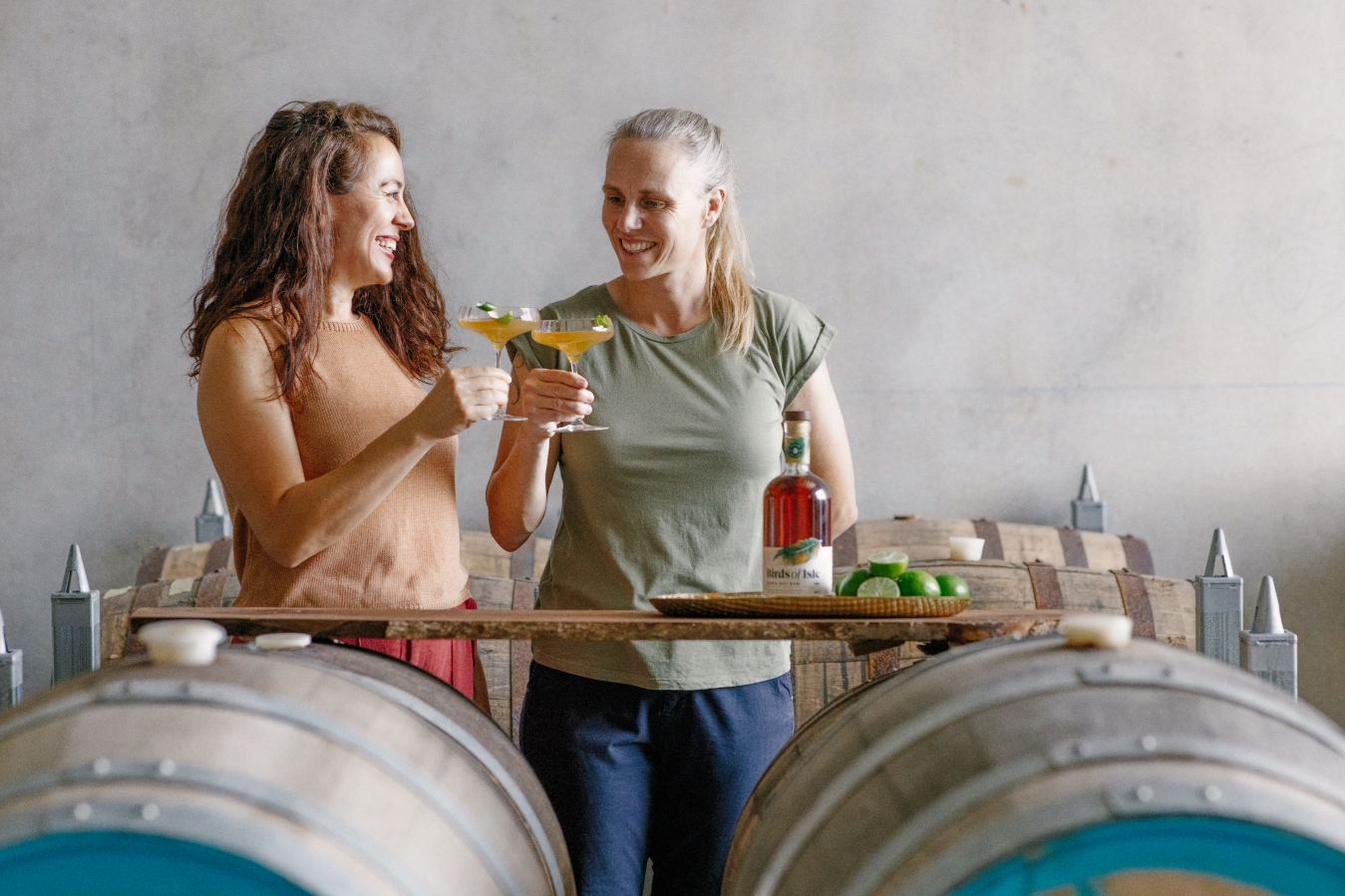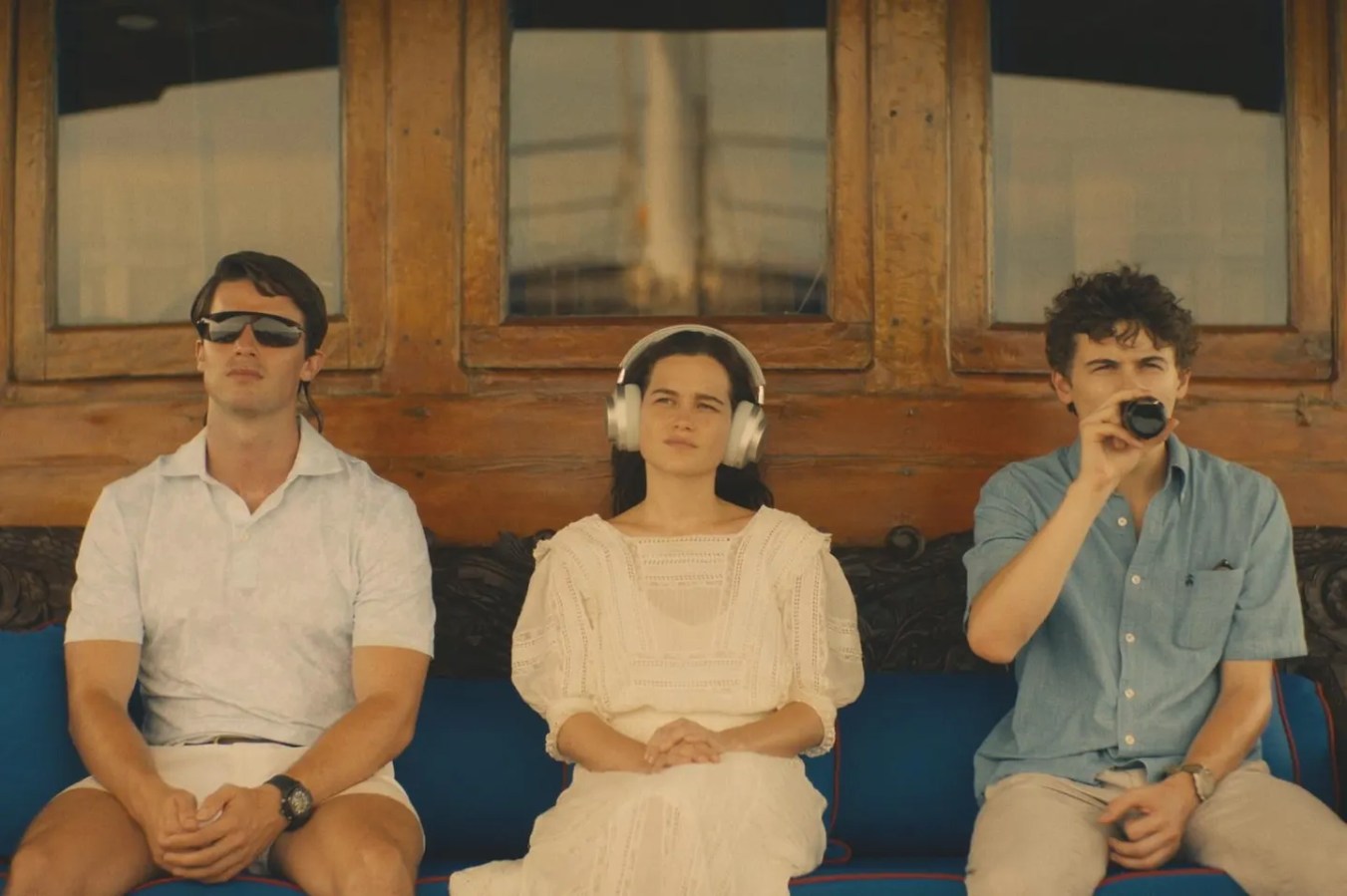The Cosmic Crisp, a fruit more than 20 years in the making, will hit Australian shops in mid-2024. Its owners are hoping for a blockbuster. We put it to the test.
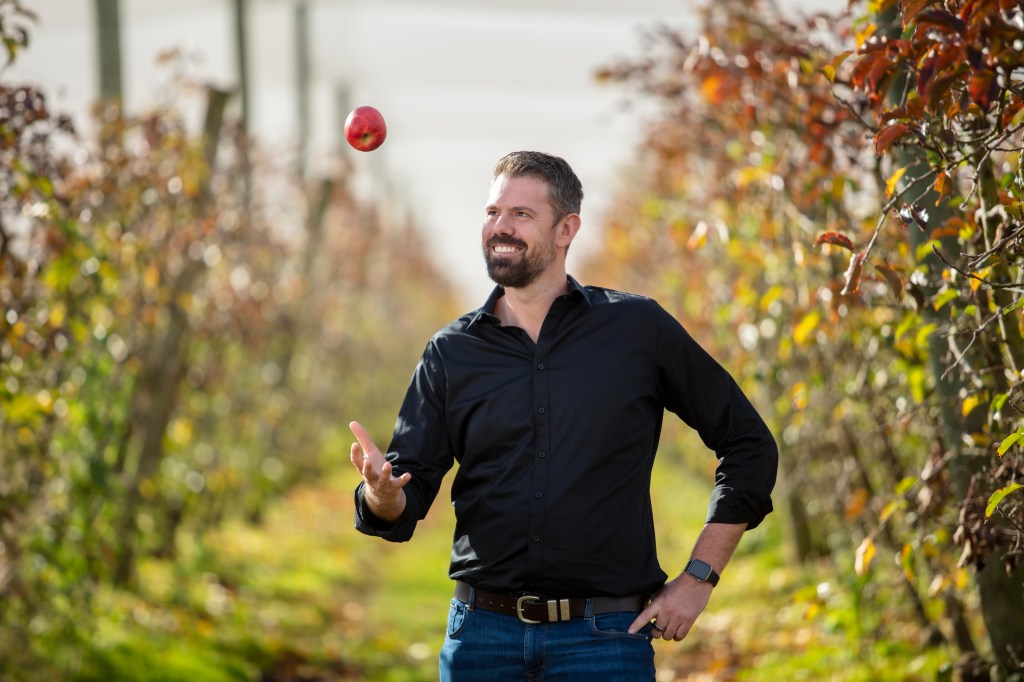
The Cosmic Crisp had everyone in the apple world talking even before it was released to US consumers with a US$10 million marketing budget and barrels of hype, four years ago.
Having been in development at Washington State University since 1997, it was getting great reviews , and some not so good. [See the Forbes Australia office poll below where we pit the up-and-comer Cosmic Crisp against the reigning champion Pink Lady] It presented Australia’s fruiterers the opportunity to own some hot IP. But it’s a lot harder launching an apple than an Apple.
Cosmic Crisp, hadn’t gone on sale in the US when Red Rich tendered Washington State University for the Australian rights in early 2019. “Everybody in apples in Australia had a go at the tender,” says Red Rich director Matt Palise. “Everybody wanted it.”
Lynnell Brandt, president of Proprietary Variety Management, was in charge of the international rollout. He said there were “five or six” bidders from Australia. But price wasn’t the main determinant of who won it. “You get the ones that work the best over the long term, and that’s where the value really is,” Brandt told Forbes Australia. “We were interested in people that were vertically integrated, had long established roots in the commercial side of marketing apples and growing apples in the Australian sector. “
A big factor was that Red Rich did not already have a proprietary apple, says Palise. “A lot of the other companies do. We could make this our hero. Our whole apple business is going to rotate around this apple for the next 15 years. That’s how confident we are in the product.”
Having won the rights, however, there was the enormous task of growing the fruit. They figured they would need more than half a million trees to meet projected demand. So Red Rich enlisted 12 other orchardists to grow them under licence in parallel with Red Rich’s own orchards. It wasn’t hard to get them on board, says Red Rich Fruit co-owner Michae Napoleone.

“We had growers ringing us saying ‘hey, congratulations. And can I plant some?’” he says.
“We’re growers so we know what growers are looking for,” Palise says. “Apples have got to be good for the consumer, but they’ve got to be as good for the grower because there’s royalties associated with these varieties [WSU gets 4.75% of the farmgate price]. It’s a grower friendly apple. The yield is great. The colour’s great.”
Apples can grow in all Australian states, but Red Rich wanted to limit the geographic variation of Cosmic Crisp in order to deliver the most consistent product possible, and also to keep food miles (and transport costs) in check. A handful of growers were chosen in the Batlow area of NSW to supply NSW and Queensland, a handful in the Yarra Valley to supply Victoria and South Australia, and one in WA to supply the west.
“Between us and the 12 growers we will have put more than $30 million into it by the time we’ve finished developing these orchards,” says Palise. “It’s going to take our business nine years to get to full production.”
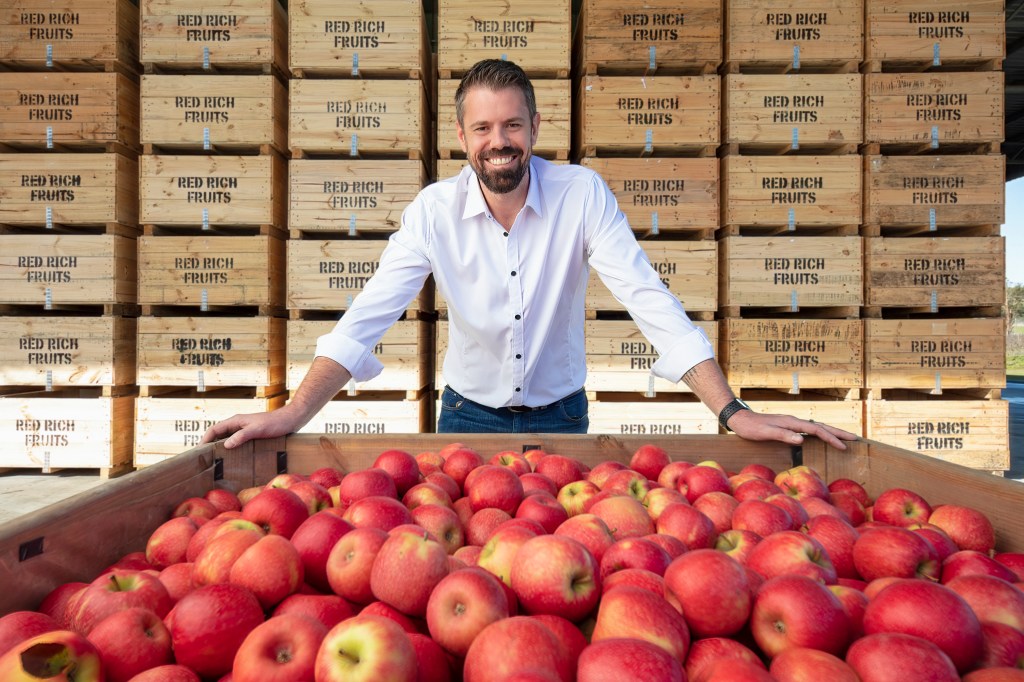
Growers of commodity apples like Royal Gala and Australia’s most popular, the Pink Lady, have little control over their costs and no control over price. “It’s open slather,” explains Napoleone. “If someone wants to come along and plant another 1,000 acres of the product, well so be it.”
Red Rich Fruits – started when Michael’s Italian migrant grandfather began growing vegetables in Victoria’s Yarra Valley in 1948 – has become one of the biggest family-owned players in Australia’s fruit scene and wanted to go next level. “We needed a variety where we could A: control the marketing, and B: control the volume,” says Napoleone.
They’d been looking for almost a decade when they came across a variety then named WA38 on an orchard walk in Washington state. “I’m a Pink Lady fan,” says Palise. “As soon as I tasted it (WA38), I wrote that name down. It had that tang, that zing. A lot of apples are crunchy water … we followed it from then on to see how it was developing.”
A lot of great tasting varieties are developed that don’t progress to market because the trees might not yield well, or the fruit might not look good or meet the requirement to stay sweet and crisp in storage for a year.
“We wanted an apple that stood up for the consumer and was good for the grower,” says Palise. “We waited nine years and when we found it, we went straight in.”
The Apple
The Cosmic Crips is a cross between the Honey Crisp and Enterprise varieties. Honey Crisp is America’s third most popular apple but it doesn’t store so well and doesn’t grow well in Australia. The Enterprise is a long-storing variety with good crunch, also not available in Australia.
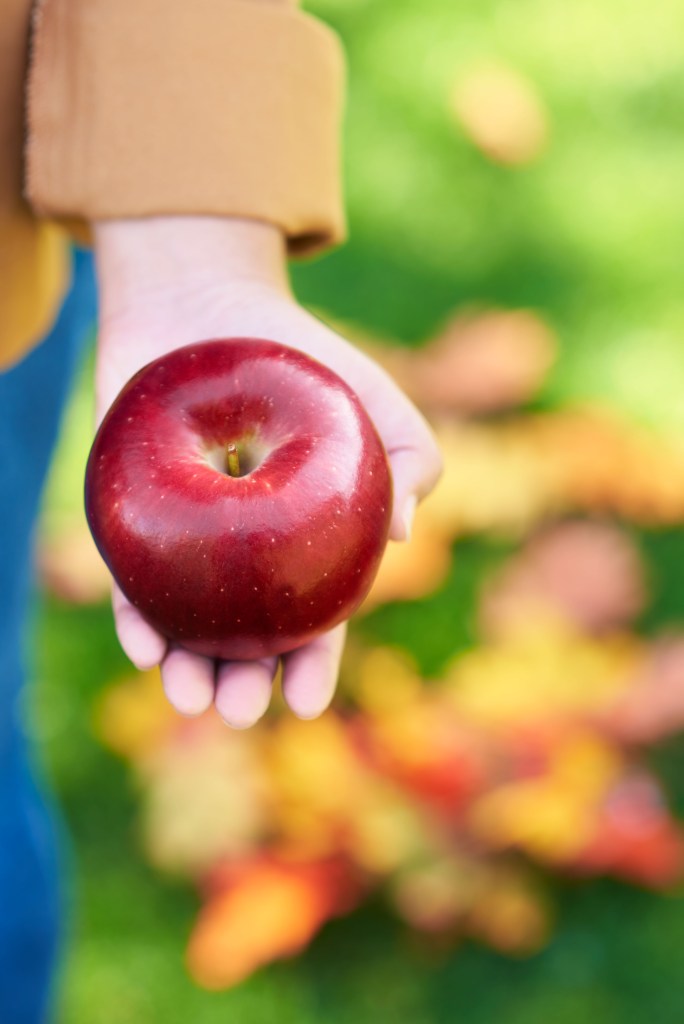
“The industry was desperately looking for a new variety to replace Red Delicious,” explains Brandt. “It’s very good for mass handling, but people were wanting to have more taste, more more ability to hold up.”
The first commercial plantings of Cosmic Crisp were in 2017, and since then 22 million trees have been planted in Washington state, which has the US monopoly. The most recent US harvest was seven-million 18kg boxes.
“It’s the fastest commercialisation of an apple variety globally, ever,” says Palise.
Cosmic Crisp last year entered America’s top ten apples by sales volume and was the fastest growing apple in a declining overall market.
Red Rich was able to bring 240 mother trees to Australia which then had their “budwood” grafted onto rootstock giving rise to 360,000 trees currently in the ground.
Australian’s per capita apple consumption has halved over the last 20 years from about 16kg to about 8kg a year. Forecast lower apple prices in coming seasons mean tough conditions ahead for the industry worth about $560 million annually. Good prices pre Covid-19 led to a lot of plantings that will come on stream from next year increasing supply at the same time as grower costs rise.
But Red Rich is getting on the front foot with a $2-million marketing budget for next year’s launch, focusing on social media. “We’re going to market this apple better than anyone has ever done it before,” says Palise. “We’ve got a very aggressive plan. We’re going to do a lot of things differently.”
Napoleone Complex
The Napoleone family has been getting on the front foot a lot over the last two decades. They’d established Punt Road Wines in 2001, Napoleone Cider in 2008 and The Farmhouse at Meletos luxury accommodation in 2015. Well entrenched as both a grower and wholesaler for other growers in Victoria, Red Rich had been eyeing northern markets for years.
“We needed to diversify,” says Napoleone.
He brought in Matt Palise, an accountant by training, to run the expansion. “We bought a business at the Sydney markets in 2010 that was turning over $9 million, and about eight years later it was turning over $100 million,” says Palise.
“Then we had to diversify into different farms, different regions,” says Napoleone. “We were handling a lot of mangoes. We needed a consistent source. An opportunity arose up in Darwin … we brought that business and have grown that up substantially.”
They now have six mango farms and a packing shed south of Darwin, plus three mandarin farms and a packing shed at Gayndah, south-east of Bundaberg, Queensland.
“We’ve had to pretty much not only invest in certain lines, but we’ve had to invest in packing sheds, farms, to give continual supply to our customers.”
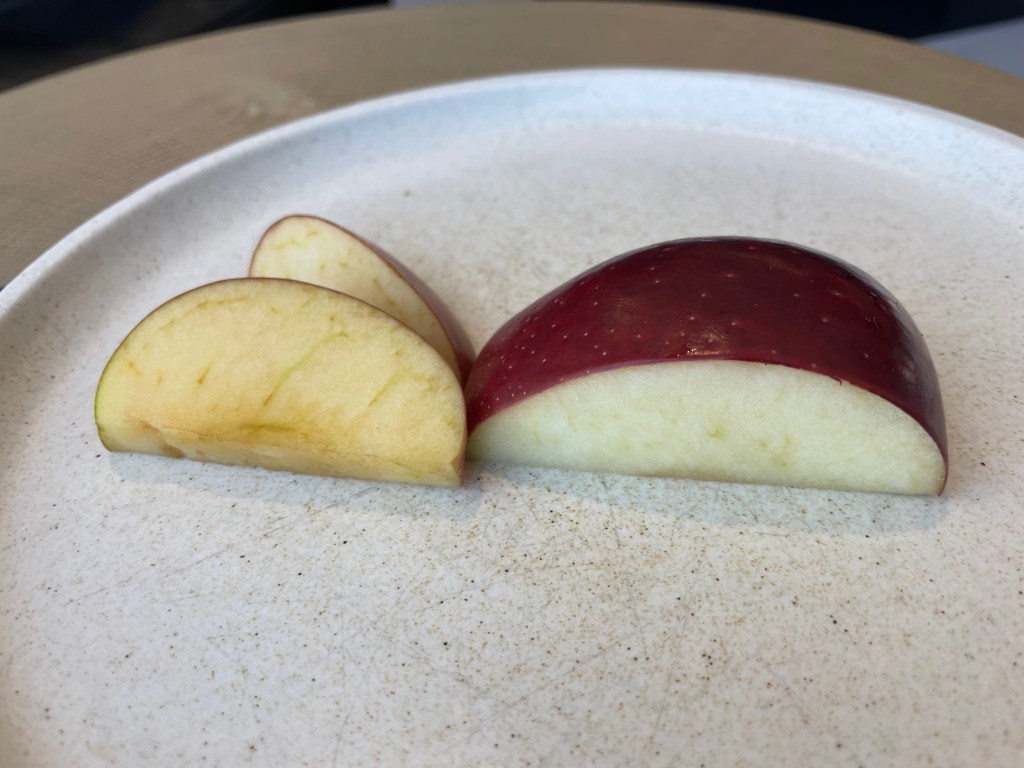
The business is turning over more than $150 million annually, Palise says. Of the $27 million that’s been invested in the Cosmic Crisp so far, more than half has come from the Napoleone family.
And going forward they’ve got their eyes on more fruit IP. Maybe a mango or melon, says Palise.
In the meantime, it’s crunch time for the Cosmic Crisp. Palise says they recently gave out samples at a supermarket trade show. The apples had been in storage for months.
“Everyone came back the next day for another sample which tells you the story. There’s nothing on the market that’s like it. It’s very hard, very crisp, very juicy and very tangy. And it’s like that every time.”
Comparing apples with apples
Forbes Australia staff taste-tested the Cosmic Crisp up against the reigning champ of Australian apples, the Pink Lady – which holds 40% of the local market.
First comparing “mouthfeel/crunch”, the Cosmic Crisp won comfortably with an average score of 4.3 out of five compared to the Pink Lady’s 3.0. No one rated the Pink Lady superior to the Cosmic Crunch in this texture category.
On taste, where one would expect the Pink Lady to be at its best, the results were more variable -clearly a matter of taste. But the Cosmic Crisp – with 3.63 out of five – edged out the Pink Lady which scored 3.38 out of five.
Bear in mind that both these apples being tested were more than six months old, with all apples in Australia being harvested in autumn – but that is the reality of what consumers and industry face.
The tasting was done blind, but after the testers had scored them on texture and taste, the Forbes staff were shown a whole Cosmic Crisp and were asked to score it on looks. They gave it an average 4.5 out 5, well ahead of the Pink Lady.
Comments included:
“It’s like an apple supermodel.”
“It’s a Snow-White apple.”
“It’s the apple from the Incredible Mr Fox.”
Emily, Brooklyn and Renato
It was noted after the test that the Pink Lady had oxidised to brown whereas an hour after being cut up, the Cosmic Crisp flesh remained white.
